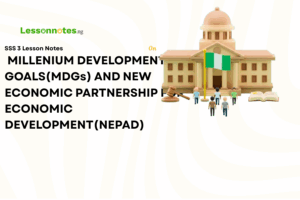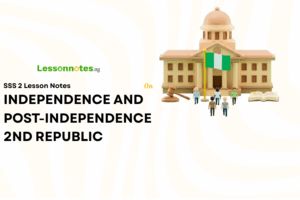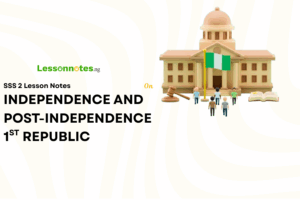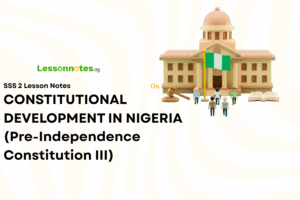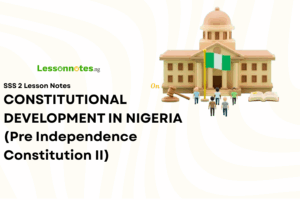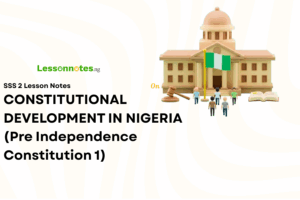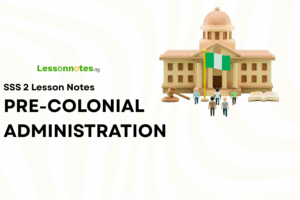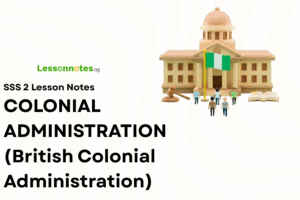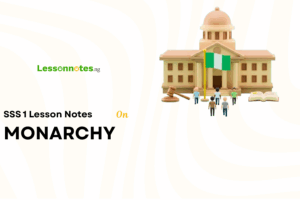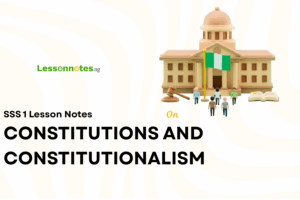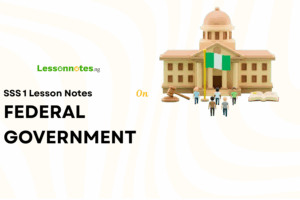Nationalism SS2 Government Lesson Note
Download Lesson Note
Lesson Notes
Topic: Nationalism

Nationalism may be defined as the efforts made by Africans to oppose or reject colonial rule. It is the love and pride in a country shown by its people or the desire by a racial group to form an independent country.
It could also be seen as a sense of oneness that emerges from social groups trying to control their destiny, and environment and to defend their group against competing groups.
FEATURES OF NATIONALISM BEFORE THE SECOND WORLD WAR
- Western Education: Western education provided a common language with which West Africa used to fight colonialism.
- World Depression: The First World War caused the World economic depression which brought about untold hardships and agitation for self-government.
- Economic Exploitation: The monopoly of trade in West Africa by European firms or companies and its exploitation gave rise to the growth of nationalism.
- Lack of Educational Facilities: The missionaries did not have enough money to finance the system. The essence of education was to enable the blacks to read and write not to produce manpower.
- High Cost of Living: The rise in prices of goods and services which resulted in a high cost of living and a fall in standard of living increased the agitation for self-government.
- Emergence of Political Parties: The demand for increased participation in the political process by parties helped the growth of nationalism.
- Religion: The activities of Christian missionaries that disregarded African tradition and culture played a significant role in the rise of nationalism in West Africa.
- Heavy Taxes: The heavy taxes imposed on Africans and the control of the money realized from such taxation helped to spark nationalist activities in West Africa.
- Racial Discrimination: The racial discrimination in the civil service practised by the rulers gave rise to the growth of nationalism in West Africa.
FACTORS THAT LED TO THE RISE AND GROWTH OF THE NATIONALIST MOVEMENT
- External Factors
- The Atlantic Charter: The publication at the end of the 2nd World War, declared the right of all people to choose the form of government under which they will live. The American government favoured decolonization and this encouraged nationalists to demand independence.
- Anti-colonial Posture of U.N.O: The organization adopted a negative posture towards colonialism and imperialism. It assisted nations fighting for independence and this revived the spirit of nationalism in the people of West Africa.
- British Labour Party: The Labour Party in Britain opposed the conservative party on their policy on colonialism. This influenced nationalism in Nigeria.
- The Independence of Some Countries: India in 1947 and Ghana in 1957 got their independence and this increased the agitation of Nigerian nationalists.
- Activities of Pan- African leaders/ Organizations: The impact of prominent individuals and black American leaders and other blacks in the Diaspora like W.E.B.Du Bois George Padmore and organizations like West Africa Union students union, Negro world movement all preached against racial discrimination and liberation of black nations from all forms of colonialism. This message inspired the spirit of nationalism.
- Loss of British Prestige: European power defeated Britain and its psychological effect influenced colonialism. Britain’s prestige worldwide was reduced.
- World War II: It exposed the myth surrounding white supremacy. The whites were in no way superior to the blacks.
- The Super Powers: The emergence of the U.S.A and U.S.S.R as superpowers after the Second World War gave courage to nationalist activities in Nigeria and West Africa.
- The Colonial Posture of the United Nations Organization.
- Internal Factors That Led To The Rise And Growth Of Nationalism
- Racial discrimination: The way the Europeans treated Nigerians in the civil service added more flames to the growth of nationalism in West Africa after 1945.
- The Introduction of the Elective Principle in 1922: This principle favoured only Lagos and Calabar. Many Nigerians were disenfranchised as such it provoked the growth of nationalism in Nigeria.
- The Return of Ex-service Men: The West African soldiers who participated in the Second World War came back with fresh ideals which they wished to put into practice to make their countries free like European nations.
- Activities of Educated Elites: Nnamdi Azikiwe, H.O.Davies, Herbert Macaulay, Obafemi Awolowo, Kwame Nkrumah, Jomo Kenyatta, etc. mobilized the masses for support during the struggle for independence.
- The establishment of political parties, and newspapers, e.g. the West Africa pilot, Lagos Daily News etc played a vital role in the decolonization process.
- Trade Unions: The railway workers union led by Michael Imodu became militant. They used strike actions to back their demand for better conditions of service. They equally supported nationalist leaders in the struggle against colonial rule.
- Poor Prices: The poor prices at which the colonial rulers bought African produce contributed to the growth of nationalism in West Africa.
- Christianity and Establishment of Schools: This made the nationalists realize that after all men are created equal by God.
FACTORS RESPONSIBLE FOR SLOW NATIONALIST ACTIVITIES IN FRENCH WEST AFRICA COLONIES
CONTENT
- Policy of Assimilation: The African elites enjoyed equal rights as there was no form of discrimination. They could not agitate or revolt since the system benefited them.
- Indignant Policy: This policy threatened the liberty of Africans. They were arrested and imprisoned without trial.
- Absence of Political Parties: This made it difficult for the people to express their political views on governing activities.
- Granting of Citizenship: France unlike Britain granted Africans from all its colonies French citizens. They enjoyed all the privileges and social amenities enjoyed by their white counterparts. Therefore it was unnecessary to form nationalist movements.
- Freedom of the Press: the government censored the press. There was no way of criticizing government policies.
EFFECTS OF NATIONALISM ON NIGERIA
- The nationalist movement led to the formation of political parties and political education e.g. NNDP, NCNC, AG.
- It led to the introduction of newspapers e.g. West Africans Pilot, Lagos Daily News etc.
- It led to the independence of Nigeria on 1st October 1960.
- It made Nigeria aware of their political and fundamental rights.
- The Nationalist movement led to constitutional development and change in Nigeria.
- It projected the image of Nigeria and West Africa to the outside World.
- It forced the colonial ruler to modify their racial discrimination in the civil service.




